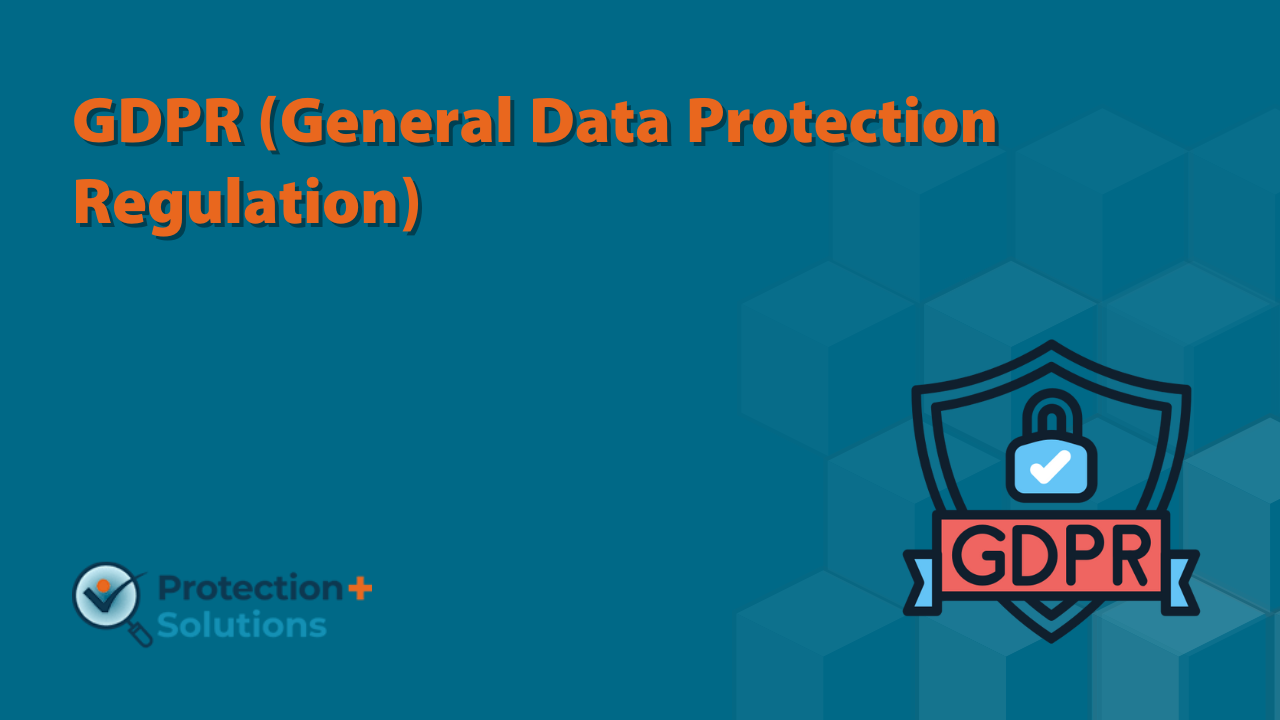GDPR (General Data Protection Regulation)

The General Data Protection Regulation (GDPR) is a law designed to protect the privacy and personal data of individuals in the European Union (EU). It applies not only to businesses within the EU but also to organizations worldwide that handle the data of EU citizens.
Why GDPR Matters Today
In today’s digital world, personal data is often called “the new oil.” From online shopping to social media, we’re constantly giving away bits of our identity. GDPR ensures that individuals have more control over how their data is collected, stored, and used.
The Origins of GDPR
Data Protection Before GDPR
Before GDPR, the EU had the Data Protection Directive of 1995. But with rapid technological advancements, it became outdated and insufficient.
The Need for Stronger Regulations
As data breaches became more common, and companies collected vast amounts of personal information, stricter rules were necessary.
When GDPR Came Into Effect
GDPR officially became enforceable on May 25, 2018. Since then, businesses across the globe have had to adapt to these new standards.
Key Principles of GDPR
Lawfulness, Fairness, and Transparency
Data must be processed legally, fairly, and in a way that’s clear to the person whose information is being collected.
Purpose Limitation
Organizations can only collect data for a specific, legitimate reason and they can’t later use it for something unrelated.
Data Minimization
Only the necessary amount of data should be collected. No extra baggage.
Accuracy and Accountability
Companies must ensure data is accurate and up to date.
Storage Limitation
Data should not be kept longer than needed.
Integrity and Confidentiality
Organizations must protect data against unauthorized access, loss, or destruction.
Rights of Individuals Under GDPR
Right to Be Informed
Individuals must know how their data is being used.
Right of Access
People can request to see the data a company holds on them.
Right to Rectification
If the data is wrong, individuals have the right to get it corrected.
Right to Erasure (Right to Be Forgotten)
People can ask companies to delete their data under certain conditions.
Right to Restrict Processing
In some cases, individuals can limit how their data is used.
Right to Data Portability
Data should be transferable from one company to another in a structured format.
Right to Object
Individuals can object to their data being used for marketing or other purposes.
Rights Related to Automated Decision-Making
People have the right not to be subject to decisions made solely by machines without human involvement.
Responsibilities of Organizations
Data Protection Officers (DPOs)
Large companies or those processing sensitive data must appoint a DPO.
Privacy by Design and Default
Data protection measures should be built into systems from the start, not added later.
Data Breach Notifications
Companies must report breaches within 72 hours.
Record-Keeping Requirements
Detailed records of processing activities are mandatory.
GDPR Compliance Process
Conducting Data Audits
Companies must understand what data they hold and how it’s processed.
Creating Privacy Policies
Clear, transparent policies build trust with customers.
Training Employees
Staff should know how to handle data responsibly.
Using Consent Properly
Consent must be freely given, specific, informed, and unambiguous. No tricky checkboxes.
Penalties and Fines Under GDPR
Categories of Fines
There are two levels of fines up to €10 million (or 2% of annual turnover) and up to €20 million (or 4% of annual turnover).
Real-World Examples of GDPR Fines
Big names like Google, British Airways, and H&M have faced massive fines for non-compliance.
Impact of GDPR on Businesses
Challenges for Small Businesses
Compliance can be expensive and complicated.
Benefits for Consumers
GDPR gives individuals peace of mind and greater control over their data.
Global Impact Beyond the EU
Even companies outside the EU must comply if they deal with EU citizens’ data, making GDPR a global standard.
Common Misconceptions About GDPR
GDPR Only Applies to EU Businesses
False—any business handling EU data must comply.
Consent Is the Only Basis for Data Processing
Not true—there are other legal bases, like contractual necessity or legal obligations.
Small Companies Are Exempt
Even small companies must comply, though the requirements might be less strict.
GDPR vs Other Privacy Regulations
GDPR vs CCPA (California Consumer Privacy Act)
CCPA focuses more on consumer rights in California, while GDPR applies across the EU and beyond.
GDPR vs HIPAA (Health Insurance Portability and Accountability Act)
HIPAA is limited to healthcare data in the U.S., while GDPR covers all personal data.
Future of Global Data Protection
More countries are adopting GDPR-like laws, signaling a shift toward stronger privacy worldwide.
Future of GDPR
Emerging Technologies and GDPR
With IoT, blockchain, and big data, compliance challenges will only grow.
AI and Data Protection Challenges
AI relies heavily on data, raising questions about fairness and bias under GDPR.
Predictions for the Next Decade
Expect stricter enforcement, higher fines, and global harmonization of data laws.
Conclusion
GDPR isn’t just a regulation it’s a shift in how we view personal data. It empowers individuals and holds businesses accountable. While compliance can be challenging, it also builds trust and transparency in the digital world.

